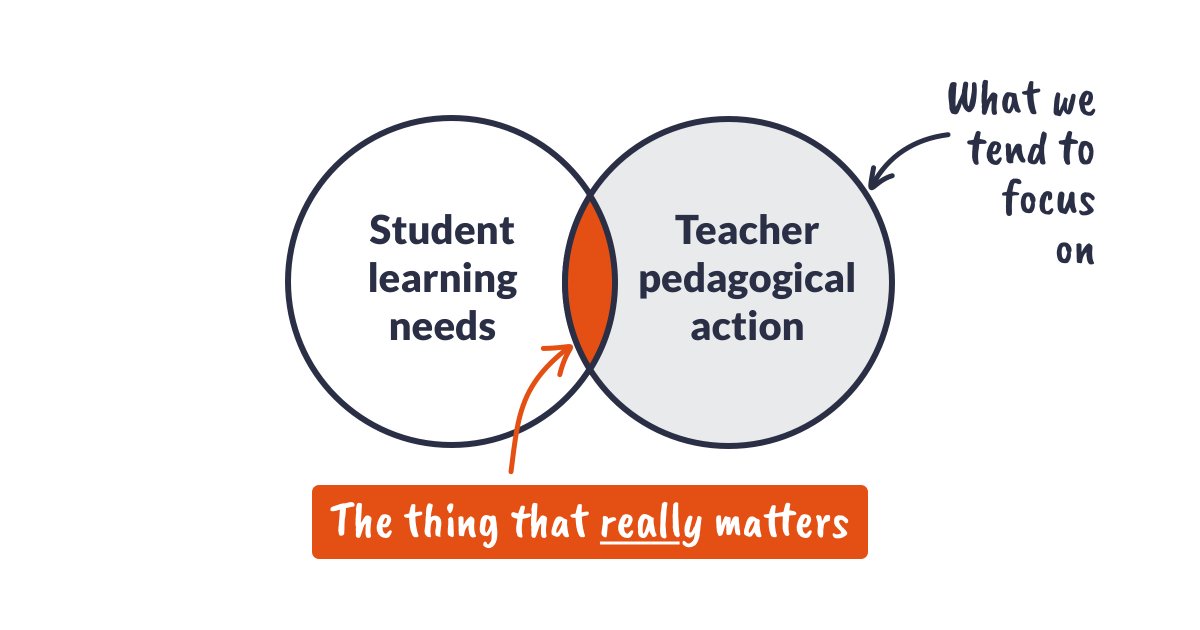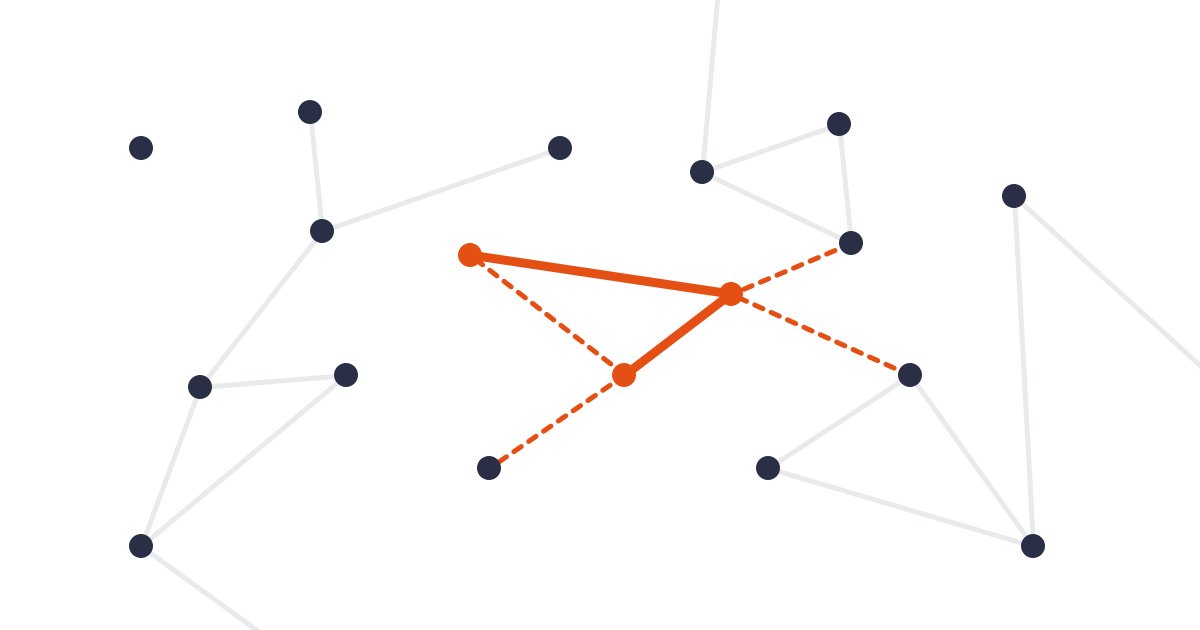I've been thinking hard about the science of learning for the last 15 years.
Here are 5 big ideas that every teacher should know, and how they hang together.
↓
Here are 5 big ideas that every teacher should know, and how they hang together.
↓
NOTE
The aim of this thread is to offer a coherent, big picture perspective of the most relevant insights around the science of learning.
An overarching structure for your mental model of learning.
It's not an attempt to provide a complete or nuanced account.
The aim of this thread is to offer a coherent, big picture perspective of the most relevant insights around the science of learning.
An overarching structure for your mental model of learning.
It's not an attempt to provide a complete or nuanced account.
BIG IDEA 1
→ Memory is a powerful lens for thinking about teaching.
Memory has a bad rep in education. It conjures up rote memorisation and superficial nmenonic devices.
However, I think we risk throwing the baby out with the bathwater if we ignore memory.
For 2 reasons...
→ Memory is a powerful lens for thinking about teaching.
Memory has a bad rep in education. It conjures up rote memorisation and superficial nmenonic devices.
However, I think we risk throwing the baby out with the bathwater if we ignore memory.
For 2 reasons...
Firstly, memory is an inextricable part of learning.
Without remembering (or forgetting), there can be no learning.
If we aspire to great teaching, then there's mileage to be had from understanding the mechanics underpinning memory.
Without remembering (or forgetting), there can be no learning.
If we aspire to great teaching, then there's mileage to be had from understanding the mechanics underpinning memory.
Secondly, adopting a memory lens opens us up to a huge body of empirical evidence from the cognitive sciences.
Cogsci controls for some the chaos of the classroom, and gives us insights that no amount of experience can generate.
Insights that power up our intuition.
Cogsci controls for some the chaos of the classroom, and gives us insights that no amount of experience can generate.
Insights that power up our intuition.
CAVEAT
Employing memory as a lens on learning is only *one* perspective, and fairly individualistic, reductionist one at that.
It doesn't do a good job of incorporating social, cultural or motivational aspects of the process.
But that definitely doesn't render it useless.
Employing memory as a lens on learning is only *one* perspective, and fairly individualistic, reductionist one at that.
It doesn't do a good job of incorporating social, cultural or motivational aspects of the process.
But that definitely doesn't render it useless.
Some have asked if cogsci is a fad?
But that feels a bit like asking a doctor if biology is a fad. Cogsci is simply one of the foundational fields for our profession.
If we want to build better professional judgement, we need to lean on evidence as well as experience.
But that feels a bit like asking a doctor if biology is a fad. Cogsci is simply one of the foundational fields for our profession.
If we want to build better professional judgement, we need to lean on evidence as well as experience.
BIG IDEA 2
→ Memory is most usefully thought of as 2 interacting components:
• Long-term memory (LTM)
• Working memory (WM)
→ Memory is most usefully thought of as 2 interacting components:
• Long-term memory (LTM)
• Working memory (WM)
LTM includes things such as understanding, skills, beliefs, identity etc. It is what we *know* and who we *are*.
It can be helpful to think of LTM as our mental map of the world.
It can be helpful to think of LTM as our mental map of the world.
WM is the instrument that focusses our attention on something, and tries to make sense of it.
If LTM is our mental map, then WM is the pencil that authors our map.
If LTM is our mental map, then WM is the pencil that authors our map.

'What we think about is what we learn'
— @DTWillingham
— @DTWillingham
@DTWillingham Within this lens:
Our goal as teachers is to help our students build their LTM, and the way we do this is by harnessing and directing their WM.
The more we understand WM, the better we can wield it.
Our goal as teachers is to help our students build their LTM, and the way we do this is by harnessing and directing their WM.
The more we understand WM, the better we can wield it.
@DTWillingham BIG IDEA 3
→ Our WM has a limited capacity.
We can only think about a few things at once.
It's a bit like juggling. If we add too many balls, we drop them all.
→ Our WM has a limited capacity.
We can only think about a few things at once.
It's a bit like juggling. If we add too many balls, we drop them all.

@DTWillingham If you want to know what it feels like to overreach our limited WM capacity, give yourself 5 seconds to memorise this 6-string:
CIBNTF
CIBNTF
@DTWillingham Now look away and test your recall. Did you remember it?
Probably.
Now try again, but this time with a 9-string:
VNCFIBNTO
Probably.
Now try again, but this time with a 9-string:
VNCFIBNTO
@DTWillingham How did you get on?
If you found it easy to hold 6 characters in mind, but struggled with 9... congrats, you're normal 👊
12-strings like this are well beyond most:
BVNCCFXIBNTO
*Whatever normal is
If you found it easy to hold 6 characters in mind, but struggled with 9... congrats, you're normal 👊
12-strings like this are well beyond most:
BVNCCFXIBNTO
*Whatever normal is
@DTWillingham It was George Miller, in a 1956 paper, who famously suggested that we can remember 7+-2 items.
However, this was for simple character strings. For anything more complex (like the stuff we teach in schools), that number drops *fast*.
However, this was for simple character strings. For anything more complex (like the stuff we teach in schools), that number drops *fast*.
@DTWillingham PAUSE
Can't we just increase the WM capacity of our students?
So far, no-one has discovered this secret sauce.
*Some have even been sued over claims they have (cough Luminosity cough)
**Plus, there are reasons why it might be important to have a limited working memory.
Can't we just increase the WM capacity of our students?
So far, no-one has discovered this secret sauce.
*Some have even been sued over claims they have (cough Luminosity cough)
**Plus, there are reasons why it might be important to have a limited working memory.
@DTWillingham BIG IDEA 4
→ LTM can help us overcome our WM limits.
The deeper and more fluent our LTM, the less our limited WM it takes up.
Take the beastly 12-string from earlier:
BVNCCFXIBNTO
If we re-arrange the letters, suddenly most people can recall it:
BBCITVCNNFOX
→ LTM can help us overcome our WM limits.
The deeper and more fluent our LTM, the less our limited WM it takes up.
Take the beastly 12-string from earlier:
BVNCCFXIBNTO
If we re-arrange the letters, suddenly most people can recall it:
BBCITVCNNFOX
@DTWillingham Our 'deep & fluent' understanding of TV acronyms has effectively reduced the number of items we're trying to recall from 12 to 4.
Reading is another great example of this effect.
Despite limited WM you can decode this string of 83 characters with speed and ease.
Reading is another great example of this effect.
Despite limited WM you can decode this string of 83 characters with speed and ease.
@DTWillingham This relationship between LTM and WM is an example of the Matthew Effect.
→ The more we know, the faster we can learn.
This reciprocal relationship is the heart of education, and teaching seeks to keep the beat.
→ The more we know, the faster we can learn.
This reciprocal relationship is the heart of education, and teaching seeks to keep the beat.
@DTWillingham BIG IDEA 5
→ Memory is organic, not digital.
Memories are stubborn to seed, often incomplete, and subject to interference from new memories and the act of recollection.
Our LTM is more like a forest than a library.
→ Memory is organic, not digital.
Memories are stubborn to seed, often incomplete, and subject to interference from new memories and the act of recollection.
Our LTM is more like a forest than a library.

@DTWillingham To get a feel for this, try quickly sketching a £5 note.
Then scroll to the end of this thread to see how accurate you were.
Despite seeing a fiver numerous times, most of us only have a partial memory of what it looks like.
Then scroll to the end of this thread to see how accurate you were.
Despite seeing a fiver numerous times, most of us only have a partial memory of what it looks like.
@DTWillingham Memory may be powerful, but it is also delicate and unwieldy.
The more we treat it as a 'living thing', the more likely we are to harness it in service of learning.
The more we treat it as a 'living thing', the more likely we are to harness it in service of learning.
@DTWillingham If you want to read more about this stuff, there are loads of great resources around.
I've pulled together a few of the finest on the link below ⤵️
→ pepsmccrea.com/resources/

I've pulled together a few of the finest on the link below ⤵️
→ pepsmccrea.com/resources/

@DTWillingham SUMMARY
1. Memory is a powerful lens
2. Memory is most usefully thought of 2 interacting components: WM & LTM
3. Our WM has a limited capacity
4. LTM can help us overcome our WM limits
5. Memory is organic, not digital
1. Memory is a powerful lens
2. Memory is most usefully thought of 2 interacting components: WM & LTM
3. Our WM has a limited capacity
4. LTM can help us overcome our WM limits
5. Memory is organic, not digital
@DTWillingham These big ideas have provided me with solid foundations upon which to build a more nuanced understanding of learning.
Let me know how your foundations differ.
👊
Let me know how your foundations differ.
👊
@DTWillingham PPS. I write a weekly 5-min email for teachers interested in this kind of stuff....
→ snacks.pepsmccrea.com

→ snacks.pepsmccrea.com

• • •
Missing some Tweet in this thread? You can try to
force a refresh










